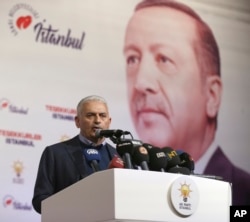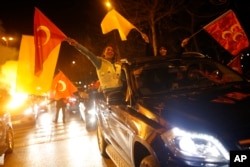"I am not worried about voting results," said Ekrem Imamoglu, the opposition mayoral candidate in Istanbul. "I am worried about a system being poorly managed." He spoke to VOA on Friday as elections officials conducted a recount of last Sunday's vote.
Friday was the fifth day of uncertainty about which candidate would take over the leadership of the city of 15 million. The vote was close, with Imamoglu, of the opposition Republican People's Party (CHP), narrowly leading the ruling AK Party candidate, former Prime Minister Binali Yildirim.
On Tuesday the AK Party, with President Recep Tayyip Erdogan at the head, filed an appeal to contest the vote in Istanbul, saying there had been irregularities and demanding a recount.
"The AK Party officials who spoke on behalf of the government contradicted their own statements," Imamoglu told VOA. "Three days before the elections, they called the election system unfailing. Now they call it doubtful. If the Election Board comes up with new practices such as recounting invalid votes, it will open the way for other abuses. Then there would be no point in holding elections at all."
The AK Party's representative on the election board, Recep Ozel, on Thursday told Turkish broadcaster A Haber that as the vote recount progressed, the difference between the vote totals would drop and his candidate, Yildirim, would emerge the winner.
Communications professor Baris Doster of Istanbul's Marmara University told VOA earlier this week that Istanbul usually leads the nation in political change.
"Results of Istanbul's local elections are so important for Turkish politics because Istanbul is the greatest city, traditionally, politically, culturally and economically," he said.
Imamoglu says allowing the elections system to be manipulated by complaints of abuse "would be irreversibly dangerous." He said the current recount is engendering mistrust in the Turkish elections system.
He also said when his party complained about irregularities in the past, the allegations were rejected.
Critics of the ruling party are skeptical that Imamoglu will ever be allowed to take office, even if the vote results are verified.
Linda Hintz, assistant professor of international relations at Johns Hopkins University in Baltimore, Md., told VOA this week that in the past, the AK Party has strategically implied that some political figures have terrorist connections in order to remove them from office. She said Interior Minister Suleyman Soylu has promised that no one with connections to terrorism will be allowed to govern.
Political observers say that regardless of the outcome of the Istanbul mayoral race, close races there and in two other major cities — Ankara and Izmir — amount to a setback for Erdogan, who has enjoyed popular support in the past.
The political issues, however, are unavoidable to everyday Turks. The country is in the grip of a recession, with inflation at nearly 20 percent and unemployment approaching record numbers. Food prices are rising by close to 30 percent.
Further, the mayorship of Istanbul has symbolic importance. Erdogan held the office from 1994 to 1998, at the beginning of his political career.







